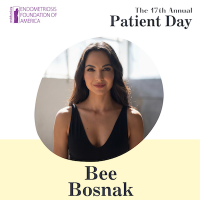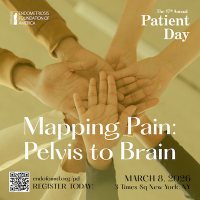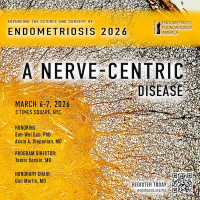This patient resource sheet is geared specifically towards endometriosis patients of color and is meant to be used in correspondence with The Endometriosis Portal for People of Color, where patients and doctors share their diagnostic journeys, treatment and management tips, and more. As minimally invasive gynecology surgeon and endo patient Dr. Soyini Hawkins shares in her video, she was taught that an endo patient very typically looks like a young, slim, caucasian woman. This is incorrect, as endometriosis does not discriminate. "Endo women of color should know that we can be sufferers of the disease too," Dr. Hawkins says. We encourage you to use this resource sheet as well as the portal to arm yourself with as much information and support as you need to receive proper diagnosis, management tools, and treatment.
What is endometriosis?
Endometriosis is a chronic disease where tissue resembling the uterine lining is found outside of the uterus. Endometriosis affects 1 in 10 women, regardless of race. Symptoms can be felt as early as the first menstrual period and can continue through menopause. The disease can be found on the ovaries, fallopian tubes, bladder, bowels (intestines), the space between the uterus and the bladder (anterior cul-de-sac), the peritoneum (the inner lining of the abdominal cavity, the rectum, and the space between the uterus and rectum (posterior cul-de-sac), as well as in the diaphragm, lungs, kidney, and appendix.
Common endometriosis symptoms may include:
-
Debilitating cramps that disrupt your daily activities
-
Long and heavy periods (for some people, this may mean lasting longer than 7 days and soaking a pad or tampon every hour)
-
Nausea, bloating, and/or vomiting
-
Constipation, diarrhea, and/or painful bowel movements
-
Painful sex
-
Infertility
There are many symptoms of endometriosis and the disease presents itself differently in all individuals. Patients may suffer from all of the symptoms above or just one. Endometriosis is often misdiagnosed as IBS or appendicitis, among other conditions. If you think endometriosis may be the source of your pain and discomfort, it is important to see a doctor.
Treat & Manage Your Endometriosis Symptoms:
While there is no cure for endometriosis, there are treatment and management options available. The earlier endometriosis is diagnosed, the better, as the disease can progress over time and symptoms can become more severe. It is important to keep in mind that there is a difference between managing and treating endometriosis. Symptom management may include use of hormonal therapies (such as birth control), physical therapy, and a change in diet. Treatment options may include laparoscopic excision surgery, which you and your doctor may consider if management options are not successful.
Not everyone is the same; every patient will benefit differently from each treatment. What may work for one person may not for another. Therefore, it is important that you work with your doctor to determine which treatment and management options are best for you.
What should I do if I think I have endometriosis?
If you’re experiencing any of the symptoms above, we suggest making an appointment with a healthcare professional. Which healthcare professional you choose will depend on your life stage and where you are in your endometriosis journey. For example, an adolescent may seek support from a school nurse or a pediatric doctor, while an adult may go to their gynecologist. Visiting your general practitioner is also an option. These healthcare professionals can give you information about endometriosis, can suspect if you have endometriosis, and may be able to manage your symptoms. However, endometriosis can only be confirmed and diagnosed by laparoscopic surgery. Therefore, you may find that you prefer to or need to seek an endometriosis specialist, who will be trained in managing the symptoms of endometriosis and also treating endometriosis.
If your pediatrician or general practitioner does not seem to be comfortable with endometriosis, look for a gynecologist, even if you are a teenager and have never seen one before. If your gynecologist does not appear to be comfortable talking about or managing endometriosis, look for a different gynecological specialist or ask for a referral to someone who may be more comfortable.
What should I expect in a healthcare professional’s office?
You know your body best, and in seeking an answer to your pain, we recommend ensuring that you have all the information you need. Whether you see your general practitioner, pediatric doctor, school nurse, gynecologist, or endometriosis specialist, you can prepare for your appointment with a healthcare professional by doing the following:
-
Gather as much information and medical history as possible. If you have medical records from previous physicians throughout your treatment, bring them to the appointment.
-
Track your cycle before your appointment.
-
Write down what your pain feels like, where you feel it, when you feel it, and at what point in time of your cycle. How much pain do you have on an average day, and how often? Is there a time of day that the pain is worse? Does the pain come and go? What helps alleviate the pain? How upsetting and disrupting is the pain to you? Do specific activities trigger your pain? Does pain interfere with your daily activities or personal routine? Do you have painful sex and does it especially hurt with certain positions?
-
Don’t be afraid to tell your doctor each one of your symptoms and be specific.
Questions to ask during your appointment:
-
What are the best ways to manage my symptoms?
-
What treatment options are available? What are the side effects?
-
How many of your patients have endometriosis? (you may want to ask this in a visit with a healthcare professional who is not an endometriosis specialist) if possible, you may want to seek a doctor who has experience treating patients with endometriosis)
-
How can I find/access an endometriosis specialist?
-
Please note: if your doctor does not provide adequate explanations or does not improve your health and wellbeing, seek another doctor.
Questions you may be asked during your appointment:
-
How long have you been feeling your symptoms?
-
Do the symptoms happen all the time, or only during and/or close to your period?
-
What is your family medical history? Do you have any female relatives who have had the same symptoms?
-
Please note: if the doctor does not ask these questions, don’t hesitate to bring them up yourself. In addition, if you encounter a doctor who believes that endometriosis is exclusively a white woman’s disease, see another doctor instead.
If the healthcare professional you’re seeing hasn’t heard of endometriosis or dismisses your pain, find a new doctor. Never be afraid to get a second opinion as endometriosis is often misdiagnosed by even the most credentialed doctors. Because of still-prevalent racial biases in the medical world, it may be more difficult to advocate for yourself in the doctor’s office about your pain. Seek out support from endo groups, family, friends, and continue to insist on telling the truth about your pain.
Tips for Finding the Right Endometriosis Specialist (if you choose to see one):
As mentioned above, endometriosis can only be confirmed by laparoscopic surgery. If you choose to visit an endometriosis specialist, we recommend finding one with expertise in laparoscopic surgery. Finding the right surgeon can be tricky, but arming yourself with research and accurate information can help simplify the process. Some patients choose to review their symptoms with their family doctor, or another trusted medical professional so that they can assist with endometriosis specialist recommendations, referrals, and follow-up care.
The proper specialist is one who has a thorough knowledge of endometriosis, including exceptional surgical skills and training, access to the most modern surgical equipment and techniques, current understanding of various treatments, and openness to complementary approaches. They should listen to you patiently and have compassion. The doctor should be willing to receive input from you and should allow ample time for thorough conversation and examination. They should explain surgical procedures and treatment options clearly and in terms you can understand. They should explain their reasons for prescribing certain medications, as well as the associated pros & cons. If you have doubts about the specialist you’re seeing, trust your intuition. Are you comfortable speaking with them? Do they listen to, acknowledge, and address your concerns? Also, make sure the doctor works cooperatively with other specialists who have a history of caring for endometriosis patients (e.g. gastrointestinal specialist doctors, pediatric gynecologists, psychotherapists, etc.)
Questions to ask your endometriosis specialist:
-
How many laparoscopies have you performed to diagnose and treat endometriosis?
-
How long have you been performing laparoscopic surgery?
-
Is it your intention to excise endometriosis at the time of the laparoscopy? If so, what method will be utilized (excision, ablation, etc.)?
-
How successful do you believe that method to be and why?
-
If the laparoscopy will be strictly diagnostic and no therapeutic measures will be taken, why?
-
Are biopsies going to be performed and sent to pathology?
-
Will you be assisted by other surgical professionals such as a bowel specialist to treat endometriosis in that area?
-
Will a bowel resection be necessary?
-
Will you search for and recognize endometriosis in all manifestations, and in all regions?
-
Will I be provided with copies of my surgical reports and any pictures or videotapes?
-
What do you expect to accomplish with the laparoscopy in terms of outcome, i.e., restoration of fertility and pain relief?
-
What is the general recurrence rates in patients you have treated?
-
Will adhesion barriers be used? If so, what kind? If not, why not?
If you are considering surgery, visit our website for more information on talking to your endometriosis specialist about surgery.
Insurance & The Financial Cost of Endometriosis Treatment
Surgical treatment for endometriosis can be very expensive and difficult to pay for, especially as ACOG does not recognize excision as a specialty. Most excision surgeons who work out of a university accept insurance, while many private practices operate out-of-network. You may still be able to negotiate with your insurer. For more information, we recommend Insurance 101: A Guide on How to Get Your Surgery Covered.
Additional Tips for People of Color with Endometriosis
While it can be difficult to discuss endometriosis with your family members, the disease may have been present in your mother, your grandmother, and other family members. Try to broach the subject while being cognizant that your family may not know the answer given cultural stigmas about discussing menstruation.
If a doctor tells you that endometriosis is exclusively a white woman’s disease, see another doctor.
If you are a Black person experiencing pain, and your doctor tells you that you can’t have endo and must instead have fibroids due to your race, see another doctor.
If you are a person of color experiencing pain, your doctor(s) may jump to suggesting hysterectomy quicker than they would for a white individual. Before considering a hysterectomy, we recommend exploring and exhausting every other available treament, such as excision surgery.







